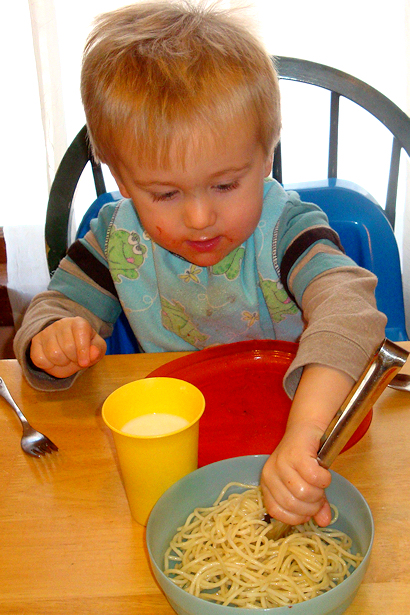 For many busy families mealtimes can be hectic and stressful. Parents have evening meetings to attend and children of all ages have after-school activities. Many teens have jobs, sports and other extracurricular activities. Elementary-age students have sports, music lessons, dance, and other activities. Even young children – preschool age to toddlers – have swimming lessons, mommy-and-me classes, and the like. Sometimes families are so busy the only meal they eat together comes from a drive-through window and is wolfed down as they drive to the next activity.
For many busy families mealtimes can be hectic and stressful. Parents have evening meetings to attend and children of all ages have after-school activities. Many teens have jobs, sports and other extracurricular activities. Elementary-age students have sports, music lessons, dance, and other activities. Even young children – preschool age to toddlers – have swimming lessons, mommy-and-me classes, and the like. Sometimes families are so busy the only meal they eat together comes from a drive-through window and is wolfed down as they drive to the next activity.
Yet when families do come together around a table to share a meal, parents want their children to display good table manners.
So how do we help our children learn good table manners when we rarely eat together?
Experts agree that children learn best from watching the people around them. When children see a behavior over and over they imitate it and make it part of their own expectations. Unfortunately, the problem for many families is that children aren’t getting the opportunity to see their parents model good table manners. After all, there isn’t much cause to ask Please pass the butter.” or “May I please have some more spaghetti?” when your dinner is in a paper wrapper on your lap.
No matter how busy families are, it’s worth the effort to plan to eat together several times a week. Not only is it a chance to practice good table manners, it’s also a time to communicate and connect with each other, and to spend some time enjoying each other’s company.
As families practice good table manners together it’s important for parents to focus on the positive, so family mealtimes are pleasant occasions. Everyone makes mistakes. Children fidget, spills happen, recipes don’t turn out, and tempers sometimes flare. When these things happen, take a deep breath and look for the humor in the situation. These everyday moments are the ones your children will remember for years to come. “Remember the time Princess accidentally dumped half the bottle of Ranch dressing all over her plate? That was so funny!”
Be consistent! Children will learn good table manners better when your expectations are clear and consistent. Parents who don’t take time to practice good table manners with their children on a regular basis or enforce their expectations inconsistently shouldn’t expect good manners to magically appear on holidays or special occasions. It’s not realistic to let Love Bug bang her spoon on the table one day and yell at her for doing it the next. Children need to know what the expectations are and what the consequences may be for unacceptable behavior.
Good manners can be reinforced at child care too. Let your child care provider know what your expectations are so she can help your child practice during child care meals too. Some of the good manners we practice at Amy & Kids Co. are taking a “practice bite” of all foods, saying “I don’t like that.” instead of “Yuck!” or “Gross!” and asking “May I please have some more peas?” instead of just saying “More peas!”
Decide ahead of time what your end-of-meal expectations will be. Will children be allowed to excuse themselves from the table when they’re done eating, or are they expected to wait until everyone is finished? If they’re expected to wait, how long will they have to wait? Keep in mind that the younger the child the more difficult it is to sit quietly, and making them sit too long is just asking for trouble.
Remember that it’s easier to catch a fly with honey than vinegar. In other words, when you see and hear good manners from your children be sure to reinforce the behavior with a smile or compliment, and a big hug. Children aim to please their parents and will bask in the glow of your approval!
Most of all, remember that although good manners are important, showing your children how much you love them is even more important. After all, nothing is more important than family.









Which one? I think there were a few… 🙂